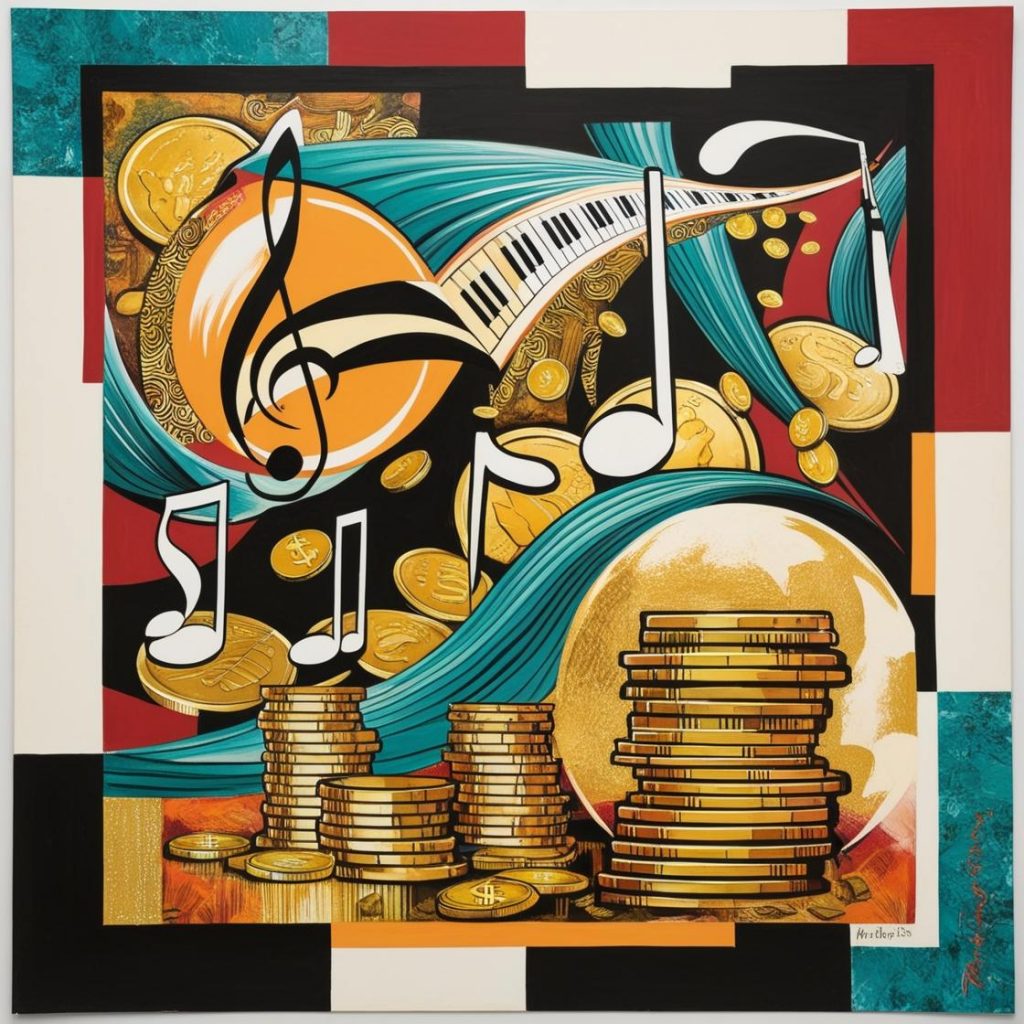Music Money: Ways Musicians Can Grow Their Wealth

Music and money
As a musician, you pour your heart and soul into your art. But wouldn’t it be wonderful if your passion also provided you with financial security? Growing your music money can seem daunting, but with the right strategies, it’s entirely achievable. In this blog post, we’ll explore various ways musicians can enhance their wealth. We’ll delve into practical implementation tips and real-world examples to guide you on your journey toward financial growth and stability.
Understand Your Revenue Streams
Before diving into specific strategies, it’s crucial to identify your current revenue streams. Musicians typically earn money through performances, music sales, streaming royalties, and merchandise sales. Knowing where your music money comes from allows you to optimize these sources and explore new ones.
1. Diversify Your Income with Live Performances
Explanation:
Live performances are a traditional yet effective way for musicians to earn money. In 2019, the live music industry generated $28 billion globally, highlighting its potential. Performing at venues, festivals, and private events not only boosts your income but also increases your exposure.
Implementation Tips:
- Network: Build relationships with venue owners and event planners.
- Online Platforms: Use platforms like Bandsintown or Songkick to find gig opportunities.
- Virtual Concerts: Leverage technology to perform live online. Platforms like Stageit can help monetize these performances.
Example:
Consider the success of artists like Billie Eilish, who used live performances and virtual concerts to grow her fan base and income. Her innovative approach to performances, such as virtual reality concerts, has set a new standard for engaging audiences.
2. Leverage Streaming Platforms
Explanation:
Streaming platforms like Spotify, Apple Music, and YouTube are indispensable for modern musicians. In 2020, streaming revenues accounted for 62.1% of the global music industry’s revenue. Although the per-stream payout may seem small, the cumulative effect can be substantial.
Implementation Tips:
- Optimize Your Profile: Ensure your profiles are complete and engaging.
- Playlists: Get your music featured on popular playlists to increase streams.
- Engage Fans: Use social media to direct traffic to your streaming pages.
Example:
Chance the Rapper famously released his music for free on streaming platforms, gaining millions of streams and using that exposure to secure lucrative concert and sponsorship deals.
3. Merchandise Sales
Explanation:
Selling merchandise is an excellent way to increase your music money while strengthening your brand. Fans love to support their favorite artists by purchasing items like t-shirts, posters, and exclusive memorabilia.
Implementation Tips:
- Design & Quality: Invest in unique and high-quality merchandise.
- Online Store: Set up an online store using platforms like Shopify to reach a global audience.
- Limited Editions: Create limited edition items to increase demand.
Example:
The rock band KISS capitalized on merchandise sales, generating millions. Their strategy included selling everything from t-shirts to action figures, proving that merchandise can significantly contribute to a musician’s wealth.
4. Licensing Your Music

Music and Money
Explanation:
Licensing your music for use in films, TV shows, commercials, and video games can be highly lucrative. Sync licensing deals allow your music to reach new audiences while providing a steady income stream.
Implementation Tips:
- Collaborate with Licensing Agencies: Partner with companies like Musicbed or Songtradr to increase your chances of securing deals.
- Create a Portfolio: Maintain a diverse catalog of songs suitable for different media.
- Negotiate Wisely: Ensure you understand the terms and potential earnings from licensing agreements.
Example:
The band Imagine Dragons achieved significant financial growth by licensing their music. Their song “Radioactive” was used in several commercials and movie trailers, leading to increased exposure and profits.
5. Crowdfunding and Fan Support
Explanation:
Crowdfunding platforms like Kickstarter and Patreon allow musicians to receive direct support from fans. This model not only provides immediate financial benefits but also fosters a deeper connection with your audience.
Implementation Tips:
- Offer Exclusive Content: Provide fans with exclusive content and experiences in exchange for their support.
- Transparent Goals: Clearly communicate your funding goals and how the money will be used.
- Engage Regularly: Keep your supporters updated with regular posts and thank them for their contributions.
Example:
Amanda Palmer, a pioneer in the crowdfunding space, raised over $1.2 million on Kickstarter for her album. She continues to engage her fan base through Patreon, ensuring a steady stream of income while creating music on her terms.
6. Teaching and Workshops
Explanation:
Sharing your musical expertise through teaching can be both rewarding and financially beneficial. Whether offering private lessons or conducting workshops, this avenue allows you to monetize your skills while helping others.
Implementation Tips:
- Identify Your Niche: Focus on what you excel at, be it guitar, vocal training, or music production.
- Online Courses: Use platforms like Udemy or Teachable to reach a broader audience.
- Local Classes: Partner with local music schools or community centers to offer in-person classes.
Example:
Many successful musicians, like violinist Lindsey Stirling, offer online courses and workshops. This not only supplements their income but also expands their influence in the music community.
7. Explore Brand Partnerships and Sponsorships
Explanation:
Partnering with brands can significantly boost your music money. Brands often seek musicians to promote their products, creating a mutually beneficial relationship.
Implementation Tips:
- Align with Your Brand: Choose partnerships that resonate with your image and values.
- Negotiate Terms: Ensure the terms of the partnership are clear and beneficial.
- Leverage Social Media: Use your online presence to highlight these partnerships effectively.
Example:
DJ Khaled has leveraged brand partnerships with companies like Weight Watchers and Apple Music. His savvy use of social media to promote these brands has resulted in substantial financial growth.
Conclusion: The Road to Financial Stability
Achieving financial stability as a musician requires creativity, dedication, and strategic planning. By exploring diverse income streams and implementing the strategies outlined here, you can significantly grow your music money. Remember, the key is to remain open to new opportunities and continually engage with your audience. Financial growth as a musician is not just about wealth; it’s about creating a sustainable career that allows you to share your passion with the world.
Embrace these strategies, and you’ll not only enjoy financial success but also leave a lasting impact in the music industry. Let your passion fuel your journey, and may your music continue to inspire and uplift others.
